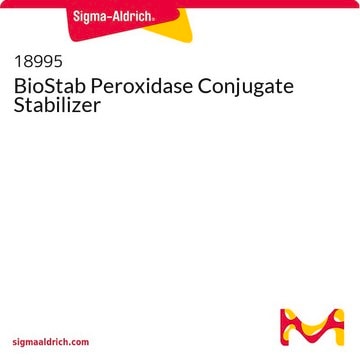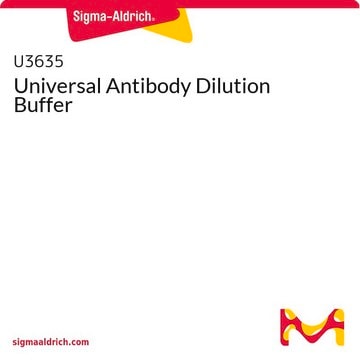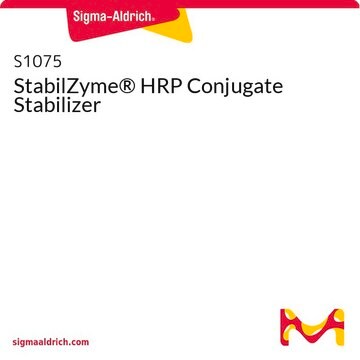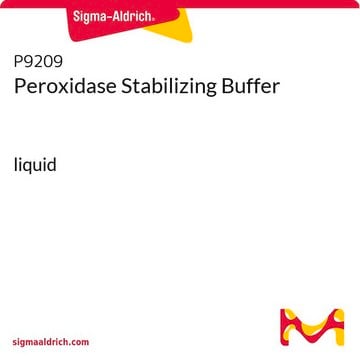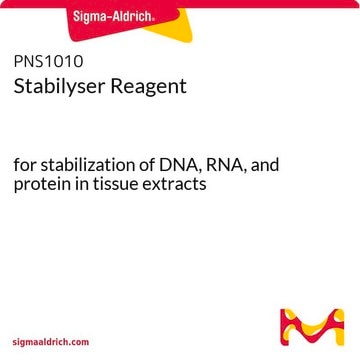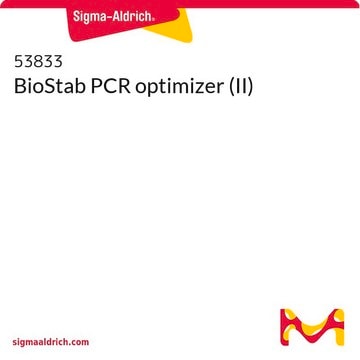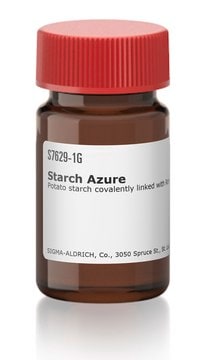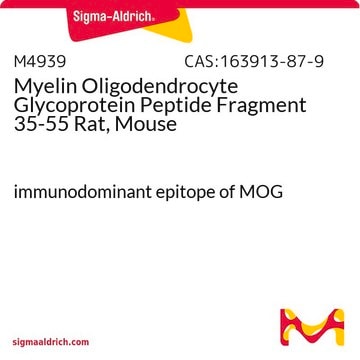55514
BioStab Antibody Stabilizer
Synonym(s):
Antibody Stabilizer BioStab
Sign Into View Organizational & Contract Pricing
All Photos(1)
About This Item
UNSPSC Code:
12352204
NACRES:
NA.25
Recommended Products
technique(s)
HPLC: suitable
Quality Level
impurities
DNases, none detected
RNases, none detected
phosphatases, none detected
proteases, none detected
suitability
corresponds for identity (HPLC)
storage temp.
2-8°C
Application
Antibodies can be protected from degradation effects using BioStab Antibody Stabilizer. The addition of BioStab Antibody Stabilizer increases life-time and the coating rates of the antibodies. BioStab Antibody Stabilizer can be used in ELISA, Western Blotting, Immunohistochemistry and any other applications which require marker or biotinylated antibodies. This stabilizer contains a minimum amount of a surfactant.
Storage Class Code
11 - Combustible Solids
WGK
WGK 3
Flash Point(F)
Not applicable
Flash Point(C)
Not applicable
Personal Protective Equipment
dust mask type N95 (US), Eyeshields, Gloves
Certificates of Analysis (COA)
Search for Certificates of Analysis (COA) by entering the products Lot/Batch Number. Lot and Batch Numbers can be found on a product’s label following the words ‘Lot’ or ‘Batch’.
Already Own This Product?
Find documentation for the products that you have recently purchased in the Document Library.
Customers Also Viewed
Jarem Edwards et al.
Clinical cancer research : an official journal of the American Association for Cancer Research, 25(11), 3247-3258 (2019-02-20)
Immunotherapies targeting costimulating and coinhibitory checkpoint receptors beyond PD-1 and CTLA-4 have entered clinical trials. Little is known about the relative abundance, coexpression, and immune cells enriched for each specific drug target, limiting understanding of the biological basis of potential
E Ron et al.
Journal of immunological methods, 180(2), 237-245 (1995-03-27)
A two step simple procedure for antibody stabilization in soluble form was developed. The antibody is first treated with low molecular weight polyaldehyde (polyglutaraldehyde). Following removal of non-bound polyaldehyde the antibody-polyaldehyde conjugate is crosslinked by polyamine (alkyl amine derivative of
Tim Serno et al.
Advanced drug delivery reviews, 63(13), 1086-1106 (2011-09-13)
Aggregation is arguably the biggest challenge for the development of stable formulations and robust manufacturing processes of therapeutic proteins. In search of novel excipients inhibiting protein aggregation, cyclodextrins and their derivatives have been under examination for use in parenteral protein
Lakshman N Subbaraman et al.
Optometry and vision science : official publication of the American Academy of Optometry, 82(3), 209-214 (2005-03-16)
Lysozyme deposits extracted from lotrafilcon silicone hydrogel (SH) contact lens materials demonstrate a loss in total mass as a function of storage time when assessed by Western blotting. This loss represents a potential source of error when quantifying total lysozyme
Eduardo P Melo et al.
Current protein & peptide science, 11(8), 744-751 (2011-01-18)
Biomedical applications of osmolytes, including stabilization of protein-based pharmaceutics, preservation of living biological material and potential therapeutic prescription in vivo, are intimately related to the fact that osmolytes favour the native structure of proteins. The shift towards the native structure
Our team of scientists has experience in all areas of research including Life Science, Material Science, Chemical Synthesis, Chromatography, Analytical and many others.
Contact Technical Service